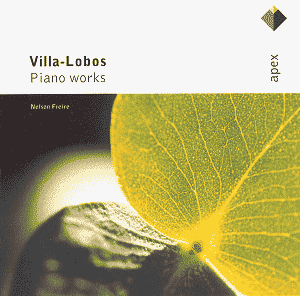Villa-Lobos’s
piano pieces are less often heard than his orchestral and guitar
works and, like them, they occasionally draw on the popular dances
and folk music of his native Brazil. Though Villa-Lobos was not
himself a brilliant pianist, these challenging keyboard essays
demand a high level of technical virtuosity, and an inherent sympathy
with their exotic flavours. He was an adventurous composer whose
versatility led him to combine contemporary influences such as
Ravel (evident in the delightful A Prole do Bebê)
with sprightly rhythms and even, in his series of Bachianas
Brasileiras, the spirit of J.S.Bach transported into an unlikely,
but oddly convincing, South American setting.
In
Nelson Freire’s sensitive playing of this synthesis is fully realised,
and with remarkable technical aplomb; but there is more to this
mercurial music than mere showmanship. The profound solemnity
of Bachianas Brasileiras No.4 clearly shows that the composer’s
intention was not to imitate the style and sound of Bach, but
to project a deeper understanding of, and respect for, the form
and expressive genius of the earlier composer. This is an important
aspect of his highly individual style. Echoes of Poulenc can be
found in the As Três Marias, three witty and melodious
trifles that leave us unprepared for the sprawling complexity
and high drama of Rudepoema, a vast concert study in the
grand manner that explores the limits of the instrument in thundering
bass passages and elaborate counterpoint interwoven with strange
harmonic contrasts and seemingly fragmented ideas. Again one marvels
at the technical assurance and sheer bravura of pianism that make
this one of the most stimulating piano discs I have heard for
a very long time. The piano sound is excellently recorded throughout.
At just over 40 minutes, my only complaint is that this recital
is somewhat short.
Roy
Brewer
